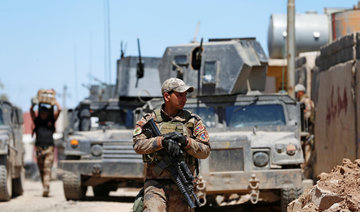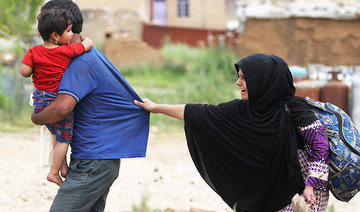JEDDAH: Analysts have welcomed the draft of a new US counterterrorism strategy, which demands allies shoulder more of the burden in the fight against violent extremism.
The Trump administration’s 11-page document, seen on Friday by Reuters, said the US should avoid costly, “open-ended” military commitments. It also, however, acknowledges that the threat of terrorism will never be totally eliminated.
“We need to intensify operations against global terrorist groups while also reducing the costs of American ‘blood and treasure’ in pursuit of our counterterrorism goals,” states the document, which is expected to be released in the coming months.
“We will seek to avoid costly, large-scale US military interventions to achieve counterterrorism objectives and will increasingly look to partners to share the responsibility for countering terrorist groups.”
Raghida Dergham, the New York-based columnist and bureau chief for Al-Hayat pan-Arab newspaper, described the strategy as a step in the right direction.
“This fight against terrorism should not be left to only the US; other states must join in,” she said. “This is exactly what the new counterterrorism strategy entails.”
Dergham said there were three important elements of the new strategy. “One, surge; two, burden sharing; and three, boots on the ground — that are not American.”
She said the Trump administration was intent on taking the fight to terror hotspots through a surge in military operations. “By burden sharing, the administration means it wants its allies, not only in NATO, but beyond, especially the Gulf states, to commit their resources and troops to the fight against terror,” she said.
The Trump administration is clear that it does not want its boots on the ground but would prefer its allies to send troops in their neighborhood to fight terror.
Dergham said the administration wanted to expand the targets of terror. “They are not confining this fight only to the struggles against Al-Qaeda, Daesh, Hezbollah or the Haqqani network, but would want to go after all those who are posing threats to different countries.”
Fahad Nazer, a political consultant based in Washington, said the fight against violent extremists such as Daesh had become one of the anchors of US-Saudi relations.
“Both countries have demonstrated their commitment to defeating terrorism in word and in deed,” he told Arab News on Saturday.
Nazer said both countries see each other as indispensable allies in the fight against terror.
“Daesh and other terrorist groups pose a threat to the security of dozens of countries all over the world, but especially Saudi Arabia and the US,” said Nazer. “It is not unreasonable for this burden to be shared by many countries. Saudi Arabia has already taken the initiative in establishing an Islamic Military Alliance (to Fight) Terrorism and has expressed a willingness to do more.”
Peter Lehr, lecturer in Terrorism Studies at the Center for the Study of Terrorism and Political Violence at St. Andrews University, Scotland, said a building capacity regionally to help states affected by terrorism was a generally positive strategy.
“Like in many wars, but particularly in a war on terrorism as a ‘dirty war,’ there simply is no perfect solution — only the least worst one. Hence, on that issue, I am on the same page as President Trump: So far, our Western (effort) to win the war on terrorism was akin to trying to put out the fire with gasoline,” he told Arab News.
“It is better to protect the home-front, and help regional states to build up their own capacity — and to desist from meddling in regional affairs that are only half-understood.”
Lehr agreed it was an “interminable” fight. “What will happen after the fall of Raqqa and Mosul? Well, ISIS (Daesh) will devolve into a terrorist organization again, one that conducts hit-and-run attacks in many different locations without being able to control large swaths of territory as before,” he said. “They will still be able to harass us at the home front (in) Paris, Berlin, London or New York and Washington for that matter.”
Ehsan M. Ahrari, adjunct research professor at the Pennsylvania-based Strategic Studies Institute, Army War College, told Arab News that Trump’s counterterrorism strategy looks much like that of the previous administration.
“As much as Trump is trying to establish some sort of distinction between his proposed counterterrorism strategy from that of President Barack Obama’s, the difference appears minimal at best.”
Ahrari also cautioned the US from depending too much on Middle East allies. “It is politically safe in the sense that it is aimed at minimizing the loss of American military personnel,” he said.
“However, such an approach also raises an important question. When was the last time any US (Arab state) ally really succeeded in their counterterrorism endeavors within their borders or in military operations conducted in (a) neighboring state?”


























